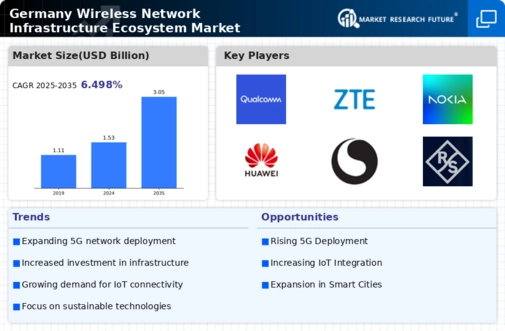Rising Demand for IoT Solutions
The increasing adoption of Internet of Things (IoT) devices in Germany is a pivotal driver for the wireless network infrastructure ecosystem market. As industries such as manufacturing, logistics, and smart cities integrate IoT solutions, the need for reliable and high-speed wireless connectivity becomes paramount. Reports suggest that the number of connected IoT devices in Germany could reach over 1 billion by 2026, necessitating substantial upgrades to existing network infrastructure. This surge in IoT adoption compels service providers to invest in advanced wireless technologies, thereby stimulating growth in the Germany wireless network infrastructure ecosystem market. The interplay between IoT and wireless infrastructure is likely to redefine operational efficiencies across various sectors.
Emerging Technologies and Innovation
The emergence of new technologies, such as artificial intelligence and machine learning, is driving innovation within the Germany wireless network infrastructure ecosystem market. These technologies require advanced network capabilities to function effectively, thereby increasing the demand for high-performance wireless infrastructure. As companies explore the potential of AI-driven applications, the need for low-latency and high-bandwidth connectivity becomes critical. By January 2026, it is anticipated that investments in these technologies will lead to a more interconnected and efficient wireless ecosystem. This trend not only enhances the capabilities of existing networks but also encourages the development of new solutions, positioning Germany as a hub for technological advancement in the wireless sector.
Investment in Smart City Initiatives
Germany's commitment to developing smart cities serves as a significant driver for the wireless network infrastructure ecosystem market. Municipalities are increasingly investing in digital solutions to enhance urban living, which includes the deployment of smart lighting, traffic management systems, and public safety networks. As of January 2026, several cities, including Berlin and Munich, have initiated projects that require robust wireless infrastructure to support these technologies. The integration of smart city initiatives is expected to create a demand for advanced wireless networks, thereby propelling growth in the industry. This trend not only improves the quality of life for residents but also positions Germany as a leader in urban innovation.
Regulatory Support for 5G Deployment
The German government actively promotes the expansion of 5G networks, which is a crucial driver for the Germany wireless network infrastructure ecosystem market. Regulatory frameworks have been established to facilitate the rapid deployment of 5G technology. The Federal Network Agency (BNetzA) has auctioned off spectrum licenses, generating significant revenue and encouraging investment in infrastructure. As of January 2026, approximately 80% of the population is expected to have access to 5G services, which indicates a robust growth trajectory for the industry. This regulatory support not only enhances connectivity but also fosters innovation in various sectors, including automotive and healthcare, thereby driving demand for advanced wireless infrastructure.
Growing Focus on Digital Transformation
The ongoing digital transformation across various sectors in Germany is a crucial driver for the wireless network infrastructure ecosystem market. Businesses are increasingly adopting digital tools and platforms to enhance operational efficiency and customer engagement. As organizations transition to cloud-based services and remote work models, the demand for reliable wireless connectivity intensifies. Data indicates that by 2026, over 70% of German companies are expected to prioritize digital transformation initiatives, which will necessitate significant investments in wireless infrastructure. This shift is likely to create opportunities for service providers and technology firms within the Germany wireless network infrastructure ecosystem market, as they seek to meet the evolving needs of businesses.



















